Medication can make a significant difference when it comes to reducing your desire to consume alcohol or use opioids, especially when it is part of a comprehensive treatment plan. Here are some of the most important things to know about medication as a tool in treating substance use disorders; all options Eleanor Health offers!
Alcohol and opioid addiction have only recently begun to be treated as the legitimate medical conditions they are, and being able to use medication to help reduce substance cravings has played an important role in helping to reduce the stigma associated with these conditions. Medication-assisted treatment for alcohol and opioid use (i.e. oxycodone, Roxycodone, Percocet, heroin, fentanyl) often results in better long term outcomes, especially when combined with therapy and other treatment options.
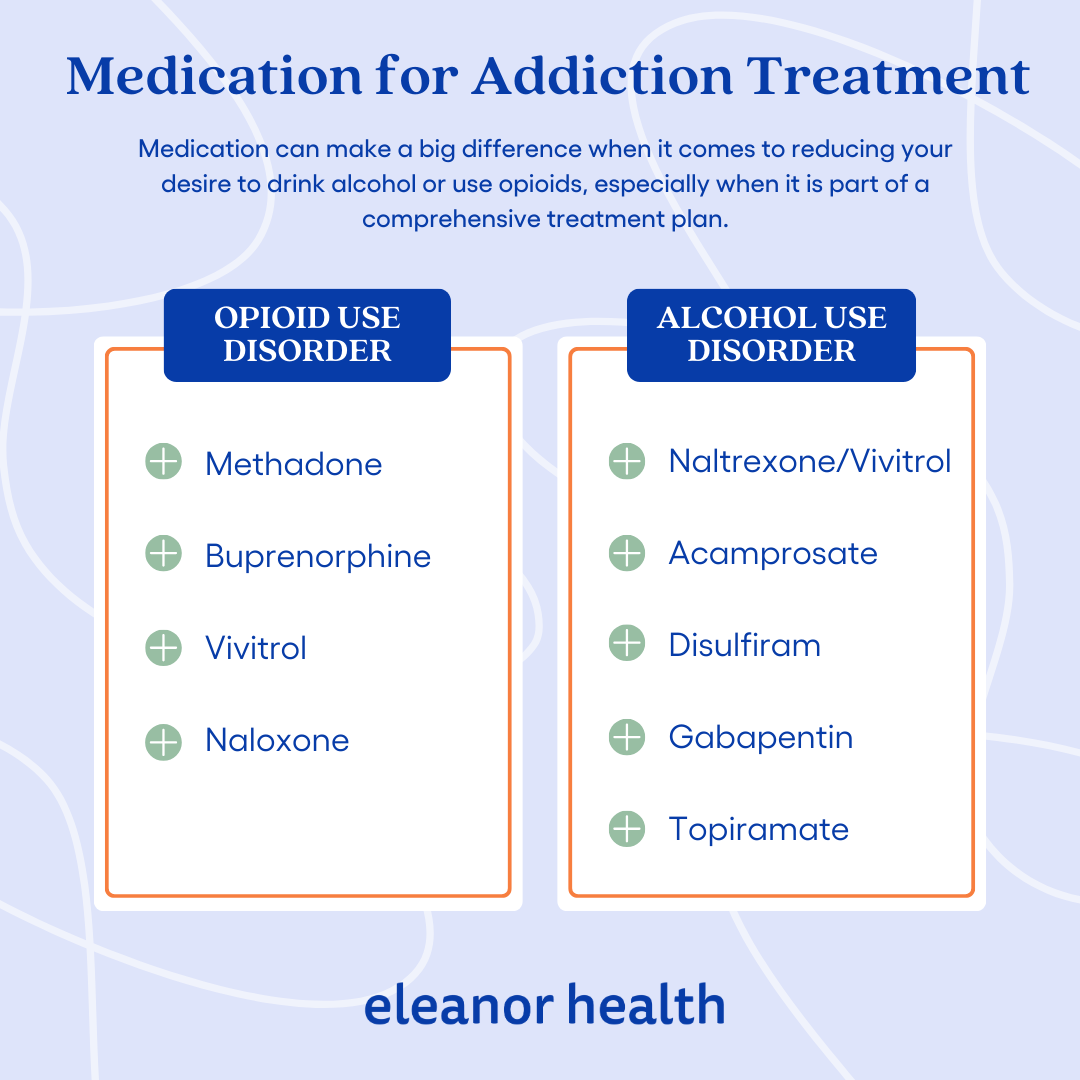
Medications can be extremely useful and effective in helping reduce cravings for using opioids, lessen the risk for withdrawal, and even block the effects of any other opioids consumed. To note, all of the medications used to treat opioid use disorder are unlikely to lead to any euphoric, or “high” feelings at prescribed doses and often are used just to feel normal again. Using these medications to treat substance use disorders is like treating high blood pressure with a blood pressure lowering medication, so it’s important that no stigma is attached to utilizing these treatment options.
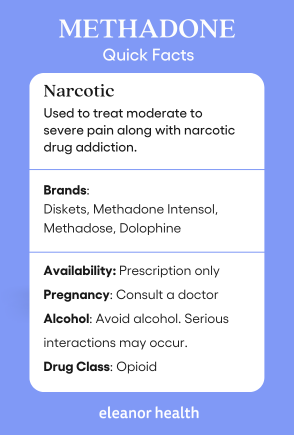
Methadone is a medication that has been around since the 1960s and is FDA approved to treat opioid withdrawal, opioid use disorder remission maintenance and chronic pain. It is a long acting opioid formulation that blunts the effects of other opioids, reduces cravings and withdrawal symptoms when getting off opioids that have more abuse potential, and relieves pain. Morphine can only be prescribed in treatment centers that are certified by federal regulating agencies and often require waiting for daily dispensing at a methadone clinic. This can be highly beneficial for individuals who benefit from daily accountability and is proven to be effective in stabilizing multiple contributing factors to opioid misuse.
Eleanor Health does not prescribe methadone or supervise its use at this time, but we may be able to provide recommendations for where you may be able to obtain it if we feel that it will be a better fit for you than any of the medications we offer.
Although it is important to take any medication as prescribed, the potential for serious side effects increases if too high a dose is taken or if it is taken with another central nervous system depressant. Most patients can safely take methadone while pregnant, but you should avoid consuming alcohol while taking this medication.
Eleanor Health does not prescribe methadone or supervise its use at this time, but we may be able to provide recommendations for where you may be able to obtain it if we feel that it will be a better fit for you than any of the medications we offer.
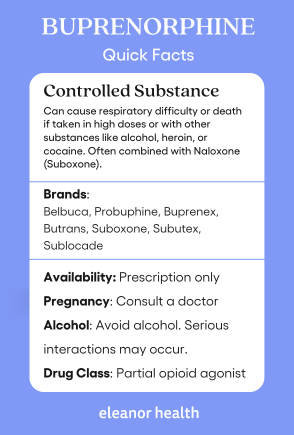
Buprenorphine is a unique opioid medication with a lower risk for misuse due to its action on the opioid receptors and its specific formulations. Buprenorphine can be prescribed by itself or together with an inactive form of a medication called naloxone (together called Suboxone), which reverses the effects of opioids; this is to help prevent tampering of the medication. It is a medication that is used to help reduce withdrawal symptoms when coming off other opioids in addition to long term prevention of relapses. Buprenorphine has helped increase access to treatment since multiple types of providers can prescribe this medication and it can be dispensed at most pharmacies. If dependent on an opioid, this medication needs to be taken in a state of at least moderate withdrawal to prevent worsening of symptoms.
Some patients may also experience severe side effects, although these concerns are relatively uncommon. However, you should seek immediate medical treatment if you experience:
Buprenorphine is generally safe to take while pregnant, but you should still inform your provider if you are pregnant or breastfeeding. Alcohol and other drugs should be avoided while taking this medication.
Vivitrol is the long acting injectable formulation of naltrexone, which is FDA approved for opioid use disorder and administered every 4 weeks. It is not an opioid and instead is an opioid blocker. It blocks the effects of other opioids that may be consumed and reduces cravings for using. Vivitrol requires a 10 day period without any opioids taken before initiating treatment to prevent risk for severe withdrawal. This medication can be a good fit for people who do not want to take any opioids for management of symptoms.
You should tell your provider if you are pregnant or have any liver or kidney issues prior to taking this Vivitrol.
Naloxone, also known as Narcan, is an opioid blocking medication that is used to help reverse overdoses. Narcan can be given by anyone in an emergency situation, and you may be able to obtain free or low-cost Narcan doses without a prescription to have on hand if you or someone in your life has a high risk of an opioid overdose. Most drugstores sell Narcan, and many states allow you to order free doses by mail. You may also have several options for obtaining free doses at healthcare facilities, local health departments, vending machines, and other locations in your city.
Multiple medications are effective at reducing alcohol cravings. Most of these medications are used for long term prevention of alcohol use and should not be consumed while still drinking, however there is an option for those who are just trying to cut back. For medications that should only be taken once alcohol is out of your system, an inpatient or outpatient detox may be required to safely transition off alcohol. This is because daily drinking can lead to physical dependence and the withdrawal syndrome from alcohol can be severe, even deadly, so quitting “cold turkey” is not recommended and it is best to work with a provider to decide if a detox is safest before starting any of these medications.
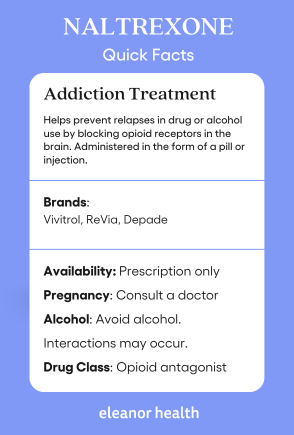
Naltrexone in both the daily pill and monthly injection form (Vivitrol) can be used to reduce alcohol cravings. Pleasurable effects of drinking alcohol can be tied to our body’s opioid system and by blocking the opioid receptors, drinking can become less enjoyable and therefore less desirable. While it’s never advised to drink while taking any medication, this medication can be used for people who are still drinking to help reduce quantity and gain control over cravings. Additionally, many who choose to not drink at all also use this medication effectively to help prevent relapses. It will not make you sick to drink while taking this medication but it can increase the risk for side effects. To note, drinking while taking naltrexone does not prevent impairment due to alcohol and should not be considered as a way to “sober up” when intoxicated. People who use opioids for pain management or have severe liver impairment should not use this medication.
Acamprosate is a very effective oral medication that can help to reduce your desire to consume alcohol. It should not be taken while still drinking because the combination can produce severe side effects. This is a medication that has to be taken three times a day for effectiveness.
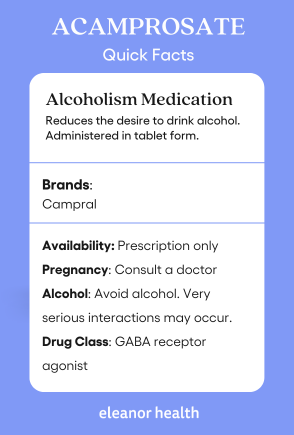
You should tell your provider if you are pregnant, breastfeeding, or have depression or other serious mental health concerns prior to taking this medication.
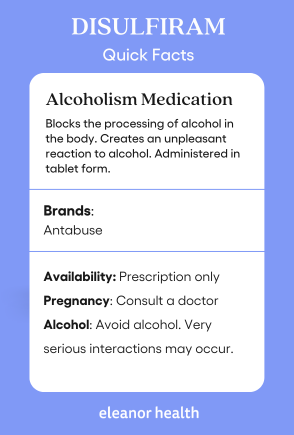
Disulfiram, or Antabuse, is another type of oral medication-assisted treatment for alcohol. This medication is not first-line treatment due to its risk for side effects, especially when taken within 48 hours of consuming alcohol. It works by affecting how we metabolize alcohol so that once alcohol is consumed, it can lead to unpleasant effects including sweating, headaches, trouble breathing, low blood pressure, fast heart rate, nausea and vomiting. These effects can be dangerous for some populations, which is why this medication is not used unless naltrexone and acamprosate have been tried first. Disulfiram can be beneficial for people who have failed alternatives and feel the accountability of risking a negative reaction can help reduce risk for relapse. To note, when taking this medication all substances that contain alcohol should be avoided to prevent the negative reaction including mouthwash that contains alcohol, cough medicine, and vinegar.
It is important to let your provider know about any other medical conditions you have because Disulfiram may worsen other conditions or interact with medications you are taking for them. Talk with your provider if you are pregnant or breastfeeding before starting this medication. Because Disulfiram can impact the functionality of your liver, you will likely need frequent blood tests while taking this medication to make sure your liver is working at a safe level.
Other medications can also be beneficial off-label to reduce alcohol cravings including medications used for seizure disorders such as gabapentin and topiramate. Speak with a provider to see if one of these alternative treatments are more appropriate for you.
While the stigma associated with alcohol and opioid use disorders has improved since it was first treated as a legitimate medical condition, it continues to be an issue that can make it difficult to seek help when you need it. Certain cultures and other demographic groups can be more resistant to the idea of taking medication or attending therapy than others, and some patients may need to be especially intentional about putting their personal needs above the opinions of the people in their lives when it comes to getting the help they need to regain control of their lives.
Accessing and affording medications for addiction treatment can also be more challenging than it should be, but many insurance plans and other programs are working to improve the options that are available to individuals of any income level.
Becoming addicted to opioids after a skateboarding injury, Steven has overcome his substance use disorder to step up for his son and his family. “I was either going to die, be homeless, end up in jail…being clean is well worth it.”
Although medication does not guarantee long term recovery on its own, it can play a valuable role in helping you manage your symptoms and regain control over your life when combined with other aspects of a comprehensive addiction recovery plan that is designed with your unique needs in mind. Patients that regularly attend therapy sessions and have a strong support network of friends, family members, and other peers typically find the most success when using medication-assisted treatment. Many patients also need to try several different medications to determine what works best for them, and we can provide initial recommendations and adjust your medication type and dosage as needed to help you find an effective treatment option for your lifestyle.
At Eleanor Health, we prioritize helping you combine mediation and other treatment options to gain the highest level of control over your substance use disorder. Contact us today to learn more about the benefits of medications for addiction treatment or to schedule an appointment!
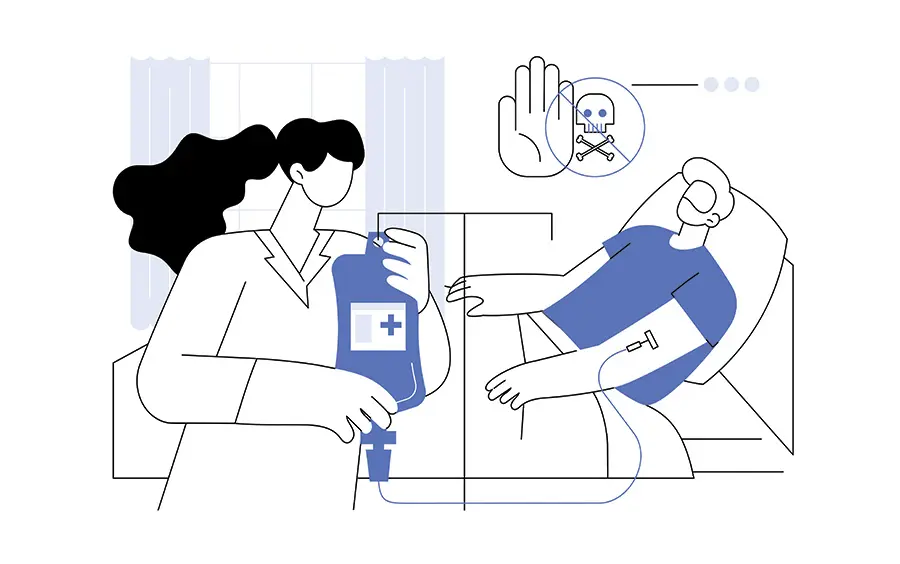 What is Medical Detox?
What is Medical Detox?
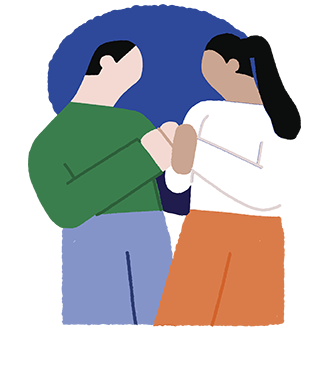 E-book: How to Help a Loved One Struggling with Substance Use Disorder
E-book: How to Help a Loved One Struggling with Substance Use Disorder
 Alcoholism: A Family Disease
Alcoholism: A Family Disease
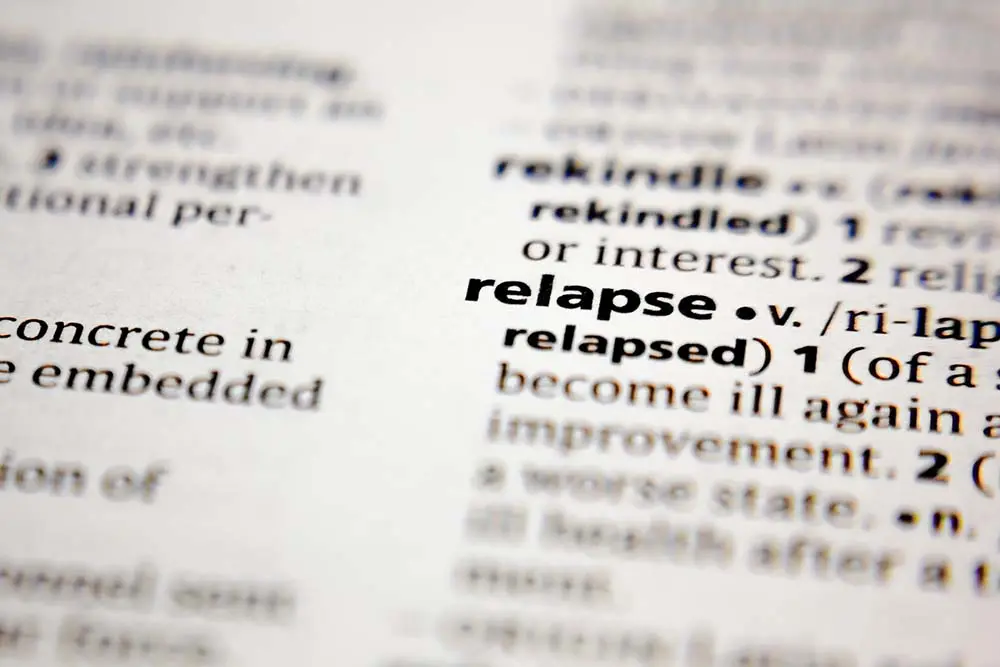 Addiction Relapse: Why It Happens & How to Prevent It
Addiction Relapse: Why It Happens & How to Prevent It
 How Alcoholism Affects PTSD
How Alcoholism Affects PTSD
 Your Guide to Addiction Recovery Resources
Your Guide to Addiction Recovery Resources